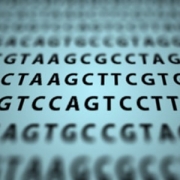Flash forward: genomics in 2022
In our second end-of-year roundup, we look ahead to three areas of genomics likely to spark discussion in the coming year
Genomics had a noteworthy 2021 – we finally completed a full sequence of the human genome, mRNA vaccines were licensed for the first time and new gene therapies were developed to treat a variety of rare diseases, alongside many other breakthroughs. But what might the next 12 months have in store?
A Mendelian milestone
2022 will mark the 200th anniversary of the birth of Gregor Mendel, the Augustinian friar whose experiments on plants laid the foundation for genetics and genomic science. Born just 11 years after Charles Darwin, his work is fundamental to modem biological science and medicine.
Without knowing anything about DNA or chromosomes, Mendel was able to discover that inherited characteristics are the result of discrete units of heredity (what we now call genes) and that these come in pairs, with one inherited from each parent.
By looking at mathematical relationships between the number of plants in each generation expressing certain traits, he was able to track genes through the generations and understand the difference between dominant and recessive alleles.
Even with all that we know now and the powerful genomic technologies available to us, Mendel’s work remains influential: we still use the word ‘mendelian’ to describe inheritance of traits governed by a single gene, as well as conditions caused by monogenic variants, including cystic fibrosis and Huntington disease.
We expect to see his invaluable contribution to genomics celebrated and revisited by many during this milestone year.
New hope for newborns
This year, a pilot programme between Genomics England and the NHS will investigate the possibilities offered by whole genome sequencing for healthy newborns.
The Newborn Genomes Programme initiative aims to sequence the whole genomes of 200,000 babies and screen them for child-onset genetic diseases where treatment or care can make a difference. This data will then be evaluated to decide whether the approach should be adopted more widely.
As with current newborn screening programmes such as the blood spot test, participation will not be compulsory and parents who are offered screening will have the choice whether to have their child tested.
This type of screening could be pivotal in the early diagnosis of genetic conditions in newborns and allow them to receive new, life-changing treatments. Last year, we covered a one-off treatment, Zolgensma, that can stop the progression of severe spinal muscular atrophy. The drug could save the lives of around 80 babies per year, but is most effective when administered before symptoms develop and so early screening will play a crucial role in its use.
Following a public dialogue exercise, Genomics England published a vision document for the project in December 2021. Although sequencing is not planned to begin until 2023, we can expect this topic to be at the forefront of discussions around genomics this year as plans progress.
Find out more about how genomic technologies are helping newborn babies and their families on our Genomics in Midwifery webpage.
Diversifying datasets
As genomics becomes more streamlined and integrated into NHS practice, it is important that all patients can benefit equally from advances in genomic medicine.
As explained in this blog article, there is a long-established bias in genomic datasets towards populations of European ancestry, meaning that results from studies may be less relevant and applicable to people from other populations.
Work to address this, including community engagement, sequencing new participants and developing analytical tools, is outlined in the government’s Genome UK: 2021 to 2022 implementation plan, but the scope of the task means that we can expect this to remain a talking point throughout 2022 and beyond.
Want to learn more about genomics as it happens? Our blog is updated every week with the latest genomics news and research, or join our mailing list for more on our programme, resources and events.
–









